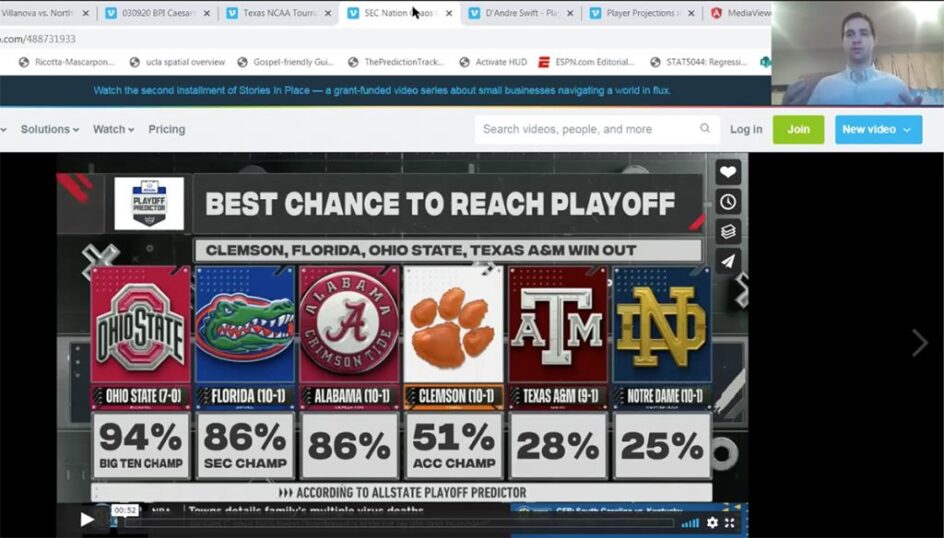Exploring and Strengthening Sports Stats at UCI
 Were you intrigued by the movie “Moneyball,” portraying the Oakland Athletics’ rise to fame in 2002 through the novel use of baseball statistics? Did you question how basketball teams were favored during this year’s March Madness? Have you ever wondered if there’s really a career path in sports related to UCI’s data science major? If so, the webinar series being offered by the Sport Statistics Group @UCI through the Donald Bren School of Information and Computer Sciences (ICS) should be of interest to you. The next webinar, to be held on May 21, 2021, will feature Brendan Kent, a senior business data analyst at DraftKings and creator and host of the Measurables podcast.
Were you intrigued by the movie “Moneyball,” portraying the Oakland Athletics’ rise to fame in 2002 through the novel use of baseball statistics? Did you question how basketball teams were favored during this year’s March Madness? Have you ever wondered if there’s really a career path in sports related to UCI’s data science major? If so, the webinar series being offered by the Sport Statistics Group @UCI through the Donald Bren School of Information and Computer Sciences (ICS) should be of interest to you. The next webinar, to be held on May 21, 2021, will feature Brendan Kent, a senior business data analyst at DraftKings and creator and host of the Measurables podcast.
“There’s a lot of interest around sports research right now,” says Statistics Professor Michele Guindani, who is helping Ph.D. student Corey Brett Katz lead the new group, along with Statistics Professors Hal Stern and Weining Shen. “Sports excites many people, so we’ve started hosting seminars to introduce students to the types of problems one might work on in sports stats.”
Providing a Behind-the-Scenes Look at Sports Stats
In the February webinar, “Presenting Sports Research to an Average Sports Fan,” ESPN Senior Sports Analytics Specialist Paul Sabin talked about the work that goes into providing the game predictions shared by ESPN newscasters and appearing on the channel’s news ticker.

In particular, he recounted his first few months at ESPN, when he was tasked with improving the college basketball power index (BPI) leading into the 2016 NCAA Basketball Tournament. Using a Bayesian model with coefficients such as “home team” or “away team” and “distance traveled,” he did a posterior predictive distribution, which ESPN started using for its on-air predictions. After the “final four” games for the men’s tournament, the model Sabin developed gave Villanova a 50.1% chance to win the championship over North Carolina.
“People don’t realize that 50.1 and 49.9 are essentially the same thing, statistically they’ve very similar,” explained Sabin. Regardless, the prediction running along the bottom of the ESPN channel had Villanova, with its 50.1%, favored to win.
“When you work in sports, you start having these rooting interests that have nothing to do with anything rational,” admitted Sabin, who had no ties to either school and didn’t really care who won. Yet based on his model, ESPN had predicted a Villanova win, so he suddenly became very invested in that outcome. “I have never been more nervous than I was at this moment.” He replayed the moment he was referring to during the webinar, transporting viewers to the final seconds of the 2016 championship, just as North Carolina tied the game.
“Well, my model was very close, 50% and the game is tied with five seconds left,” he recalled thinking at the time. “That’s what the highest probability was — this outcome — but I also wanted people to not lose trust in me.”
Villanova then won the game with a buzzer-beater basket. “The game had an incredible finish,” said Sabin, and the ESPN prediction had been correct. (There’s more to the story, including a statistical twist and lessons learned, so if you’re affiliated with UCI, be sure to watch the recording with your UCnet ID.)
During the webinar, Sabin also talked about how “it was sports that really generated my love of statistics in the first place,” and he explained how using sports analogies helped him make sense of difficult concepts in college. When he couldn’t grasp the idea of n-dimensional space, he thought of it in terms of having five different variables and trying to predict the outcome of a game. “It’s easier to understand concepts if applied to a passion like sports,” he said, which he views as opportunity for introducing new students to statistics. “I’m a big believer that using sports can help increase diversity in STEM education.”
Guindani similarly views sports as a potential recruitment tool. “It’s an area that provides opportunities for getting students excited about statistics.”
Leveraging Sports Webinars for Recruitment
Sabin’s talk was one of a series of webinars offered by the Sport Statistics Group. Recordings of the other webinars are available online with your UCnet ID:
- “Career Paths in Statistics,” with Luke Bornn, co-founder and chief scientist of Zelus Analytics (recording);
- “Data and Statistics in Baseball: What it’s Like to Work in a Baseball Analytics Department,” with Kevin Ferris of the Boston Red Sox and Richard Anderson of the Cincinnati Reds (recording); and
- “Watching Sports Through the Eyes of a Statistician,” with Hal Stern of the Department of Statistics (recording).
As noted earlier, the next webinar will feature Brendan Kent of DraftKings and creator the Measurables educational sports analytics and sports tech podcast. While a UCnet ID is required to view recordings of previous events, the live webinars are open to anyone — from high school students exploring potential majors and career options to professional sports analysts or even international statisticians. Visit the Events page for log-in information.
However, the long-term goal of these webinars is to help recruit a dedicated group of UCI students interested in working on a variety of projects related to sports stats. The hope is that students, after watching a webinar, will get involved with the Sport Statistics @UCI group. “Any UCI students can join the group — all ICS students are welcome, as well as students who might be majoring in a different field, e.g. economics or psychology,” says Guindani. “It would be awesome to put together a group that could eventually collaborate with UCI’s athletics department or other local sports teams.”
Anyone interested in learning more about joining or collaborating with the group can visit the Sport Statistics Group @UCI webpage or email sportstatisticsUCI@gmail.com.
— Shani Murray